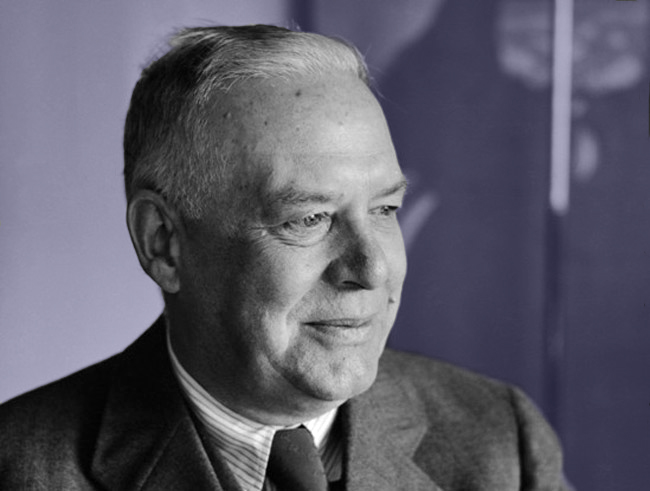
Below, a letter from Wallace Stevens to his wife Elsie, written during a trip to Cuba.
February 4, 1923, Havana
My dear Elsie:
I arrived here Friday evening after a very pleasant trip from Key West on the Cuba of the P. & O. line. The place is infinitely more Spanish than I had supposed. I went up to a nigger policeman to get my bearings and found that the poor thing could not even understand me. Eventually, I wound up at the Hotel La Union where I had such an impossible bed with such remarkable pillows that on Saturday morning the first thing I did was to move over to the Sevilla. Here I am as comfortable as one would be anywhere. On Saturday afternoon I went to the races, a great institution here, and was bored to death. In the evening I went to see a game of jai alai, the Spanish national game. This morning and early this afternoon, until it grew too warm, I walked all over town. The place is enormous. I think that there are over a half-million people here. All the same, there is a dreadful sameness to it and after a half days trotting around one is glad to get back to one’s room. The homes here are built around interior open air courts full of plants. The front rooms of the houses, through which you look into the courts, are full of the damnedest junk you ever saw: statuary, eighteenth-century furniture, ornaments of all kinds. But these interior courts are the coolest places in the world. Children play in them dressed in little or nothing. The sun does not enter them except at mid-day. The houses do not have wooden floors but floors of tiles. The window in my room does not have any glass in it. It consists simply of a set of blinds with inside wooden shutters. When you throw open the blinds, it is like removing a large part of the wall. The evenings are fresh but not cold and as the whole hotel is built so as to circulate the air one sleeps like the king of sleep. I take my meals in different places. Last evening I had dinner at the British Club with the representative of the Aetna. This morning I had breakfast here at the Sevilla and at noon I had luncheon at El Telegrafo, Cuban lobster, banana bread, cocoanut milk ice cream and a pot of Cuban coffee. The Cubans make most excellent coffee: quite black but mild. This evening I expect Mr. Marion, one of the representatives of the Hartford Fire, to come for me and to go to dinner with me, probably to the Casino, one of the show places of the city. During my walk this morning I dropped into every big church that I passed so that I can honestly say that I went to church most assiduously. They are all Catholic, gorgeous and shabby, most of them older than the oldest buildings at home. But everything here is an object of interest: the bootblacks sit down when they shine your shoes, everybody takes off his hat when a hearse passes, colored women smoke cigars, the streets are full of Fords which carry you, usually for twenty cents, almost anywhere, the finer automobiles are as gaudy as morning glories, the Cubans use the same kind of money that we do: silver up to a dollar. They do not have any paper money but use ours as a substitute which is a great convenience. I leave here at four o’clock tomorrow, Monday, afternoon and go by steamer directly to Miami, Florida, arriving there on Tuesday morning. From that time on I shall be at work again. […] Of course, I feel rather sinful about running over here to Havana. But it is not a very great sin and, if you really wanted me to have a vacation in my own way, I have had it; for I enjoy nothing more than seeing new places and this one is new and strange from top to bottom. But it is the last place in the world that I should care to live in. There are plenty of places where English is spoken but to move about freely it is imperative to know Spanish. Even the Chinese speak it. There are a good many Chinese here. They sell cakes, fish etc. One came up to me on the street with a big box swung over his shoulder and said “Hot Peanuts!” That’s the life. My window looks out over the Prado, a short boulevard running down to the Malecon or sea-wall. A Sunday afternoon procession of pedestrians and automobiles in passing. Morro Castle, the old Spanish fortress is only a few blocks away but on the other side of the harbor. I have not been over to see it because I could see all I wanted from this side. It goes without saying that good cigars are as cheap as dirt. However, I have found a good Havana cigarette made of real tobacco which I rather like and as Havana cigars are rather strong I smoke more cigarettes than cigars. I have been looking around for something to bring home to you as a souvenir but I confess that the shops are baffling: Spanish shawls that would drive you mad etc. But I hope to find something in the morning . . The lamp-lighter with his long pole is lighting the lamps on the Prado. A man on horse-back has just gone by dressed in white. The colors of the dresses in the automobiles seem chiefly to be shades of pink and orange. When I came in I put on my pajamas to cool off. But as it is now evening I shall dress again and stir about a little.
With love,
Wallace.
+


